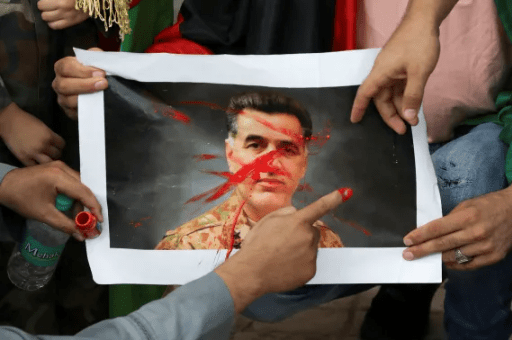The military of Pakistan accuses the former intelligence head of engaging in “political activities.”

Islamabad, Pakistan – Pakistan’s military has charged a former spy chief with “engaging in political activities”, in essence accusing him of working with ex-Prime Minister Imran Khan to destabilise the nation.
The chargesheet against retired Lieutenant-General Faiz Hamid, the former head of Pakistan’s Inter-Services Intelligence (ISI), follows months of investigations and proceedings under the Pakistan Army Act. Hamid was arrested in August this year.
“During the process, the involvement of Lt Gen Faiz Hamid (Retd) in events related to creating agitation and unrest, leading up to multiple incidents, including but not limited to the events of May 9, 2023, aimed at fomenting instability at the behest of and in collusion with vested political interests—is also being separately investigated,” the statement by the Inter-Services Public Relations, the military’s media wing, on Tuesday read.
On that date, Khan’s arrest in connection with a corruption case led to protests by supporters of his Pakistan Tehreek-e-Insaf (PTI) party. The demonstrators targeted state buildings and military installations. Thousands of people were arrested, of whom about 100 faced military trials. Khan is also facing several cases related to May 9.
According to the ISPR, Hamid has also been indicted for violations of the Official Secrets Act, misuse of authority, and improper use of government resources, among other charges.
Hamid’s arrest in August 2024 was prompted by what the military described as “multiple instances of violation” of the Army Act, following his retirement in December 2022.
The ISPR stated at the time that the action against Hamid was taken in accordance with a Supreme Court directive. This order stemmed from a petition by the land development company Top City, which alleged that Hamid and his brother had acquired properties illegally and blackmailed the company’s owner. Hamid has not commented on the accusations against him, either when he was arrested in August, or since then.
Days after his arrest, three other retired army officers were also detained for “actions prejudicial to military discipline”. Those arrests are widely believed to have been connected to the proceedings against Hamid.
While the government has yet to comment on the charge sheet released, Defence Minister Khawaja Asif stated in August that the former three-star general had meddled in political affairs even after his retirement.
“General Faiz was definitely involved in the political events that unfolded after his retirement,” Asif said on August 12, when news of Hamid’s court martial was made public.
Who is Faiz Hamid?
Once considered a close confidant of former Prime Minister Khan and a contender for the position of army chief, Hamid opted for early retirement in December 2022, shortly after General Asim Munir took command of the army.
Hamid served in various roles within the ISI before being handpicked by Khan to head the agency in June 2019, replacing Munir.
His two-year tenure at the ISI was marked by allegations that he politically targeted Khan’s rivals, many of whom were jailed; cracked down on media, violated human rights, and suppressed protest movements across the country.
Hamid gained further international attention in August 2021 when he was photographed at a Kabul hotel shortly after the Taliban seized control of Afghanistan.
Following his move out of the ISI, Hamid, as Peshawar Corps Commander, facilitated talks between the government and the Pakistan Taliban.
Hamid also played a key role in negotiating with the far-right religious party Tehreek-e-Labbaik Pakistan (TLP) during their protests in 2017 against the then-governing Pakistan Muslim League-Nawaz (PML-N), when he was deputed at the ISI as a senior official responsible for counterintelligence.
“Suspicious motive”
The Pakistani military, widely regarded as the country’s most influential institution, has directly ruled for more than 30 years of Pakistan’s history. However, despite facing persistent allegations of political interference, no former spy chief has ever faced a court martial.
Former Army Chief General Qamar Javed Bajwa, under whom Hamid served as ISI chief and later as Peshawar Corps Commander, has also faced accusations of supporting Khan and engineering his rise to power.
In his farewell address in November 2022, Bajwa acknowledged the military’s unconstitutional interference in politics over the past seven decades and promised reform.
“In my opinion, the reason for this is the constant meddling by the army in politics for the last 70 years, which is unconstitutional,” Bajwa said, adding that the military had initiated its “catharsis.” He expressed hope that political parties would also reflect on their actions.
However, some retired senior military officials believe that the military’s interference in political matters persists and have criticised the court martial against Hamid as incomplete without holding Bajwa accountable.
“Hamid could have only engaged in political activities under explicit instructions from Bajwa, who was leading the army,” a retired general told Al Jazeera on condition of anonymity.
He dismissed many of the allegations against Hamid as “hogwash” and expressed scepticism about the fairness of the investigation.
The retired official also noted that the court martial of a military officer has never before been so openly publicised.
“These matters are usually kept out of the public eye. This unusual dissemination of information raises questions about the motives behind the entire exercise,” the retired three-star general said.
Political commentator Muneeb Farooq says that the court martial proceedings against the former ISI chief were “completely unheard” of in Pakistani history.
But this, he said, showed the significance and seriousness of the charges against Hamid. “It appears that the military has some evidence of Hamid’s alleged involvement in intrigue and attempts to sabotage current army chief Munir’s appointment two years ago,” Farooq told Al Jazeera.
The Lahore-based analyst added that the charge sheet essentially accuses Hamid of being a “conspirator or accomplice in cahoots” with Khan, especially during the events of May 9.






